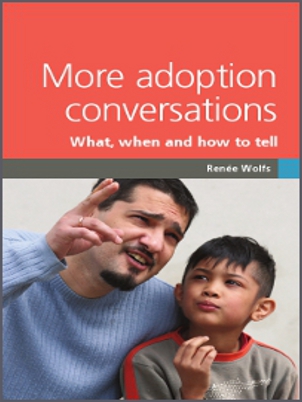
More adoption conversations
£12.95
Why do adopted teenagers feel the way they do? How much of this is due to their being adopted or to the changes that puberty brings? How can parents help their children to confront and deal with the turbulence of their teenage years, their identity crises and their adoption-related problems?
This in-depth practical guide, written by an adoptive parent for adoptive parents, explores the problems that adopted teenagers (up to 18 years old) are likely to confront and provides suggestions for helpful solutions and achievable communication methods.
This invaluable guide, brimming with advice and ideas, will help parents discuss the known – or unknown – aspects of their adopted teenager’s history and be well-equipped to communicate difficult issues.
Who is this book for?
Adoptive parents looking for advice on how to talk to their child aged 10–18 about their past, including dealing with sensitive questions.
Although the guide focuses primarily on children adopted from abroad, the practical advice offered can be helpful in relationships with any adopted young person.
What you will find in this book
More adoption conversations considers:
- The complex feelings that adopted teenagers can have
- Adoption-related problems that surface during puberty
- Why adopted teenagers feel and behave the way they do
- Talking about painful events and acknowledging difference
- How to help an adopted young person deal with their grief and anger
- Establishing meaningful dialogues and using communication techniques effectively
Examples of dialogue and suggested questions and answers about a range of subjects surrounding adoption are included. Quotations from young people about their thoughts, feelings and frustrations help bring the text to life.
Author
Renée Wolfs is a mother of three children adopted from China. She works as a freelance journalist, editor and author. Her personal involvement in adoption, coupled with her communication expertise and a knowledge of developmental psychology, led Renée to question what exactly children should be told about their adoption story, and at what age.
NOW AVAILABLE IN EBOOK AND HARD COPY
This title is now available in digital-only format for immediate access. Purchases are held in your own personalised online library and accessed via your browser or through the app on your phone or tablet.
Questions about eBooks? Check out our FAQs£12.95
Reviews
Dutch writer Renee Wolfs’ new book More Adoption Conversations deals with parenting adopted teenagers. It’s a continuation of her 2008 book Adoption Conversations which deals with adoption parenting twelves and under. More Adoption Conversations puts the same emphasis on helping parents find ways to open a dialogue on adoption with their children as the earlier book, with prominence given to verbal discussion of adoption issues in spoken exchanges with the children. Further, the book targets both domestic and intercountry adoptive families. Since dealing with teenagers is a subject which most parents approach with some trepidation, this book looks set to be a welcome resource for adoptive parents, and agency reading lists.
Smc McRae, Amazon.co.uk
I am an adoptive parent who is very interested in adoption issues. I found this book a little heavy reading but at the same time very informative giving great advice. The book is very thought-provoking and many things echoed by adopted parents brought my past thoughts to my mind again. The advice given throughout this book is very good and I would, for this reason recommend this book to adoptive parents of children about to reach puberty. They would be able to go back to this book again and again.
Beverley Walker, adoptive mother, Adoption Today, adoptionuk.org
The book is well-structured. The core of the book lies, for me, in suggestions how adoptive parents may usefully open, hold and develop ‘adoption conversations’ with their teenagers. And most usefully, the author uses apposite quotes from adopted teens to illuminate the points she makes. This book is a good addition to adopters’ bookshelves.
Amazon.co.uk
